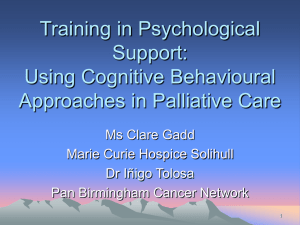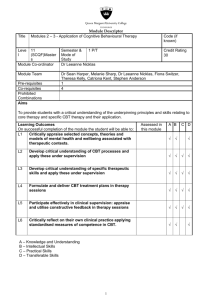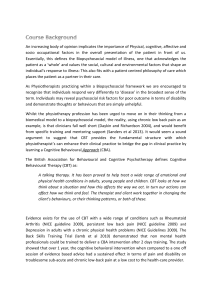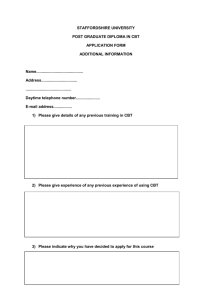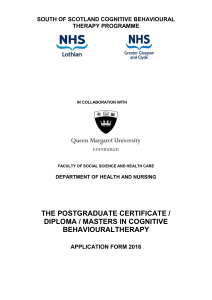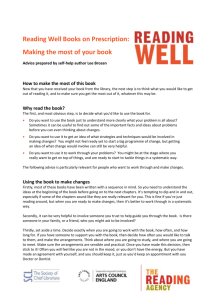BABCP MINIMUM TRAINING STANDARDS
advertisement
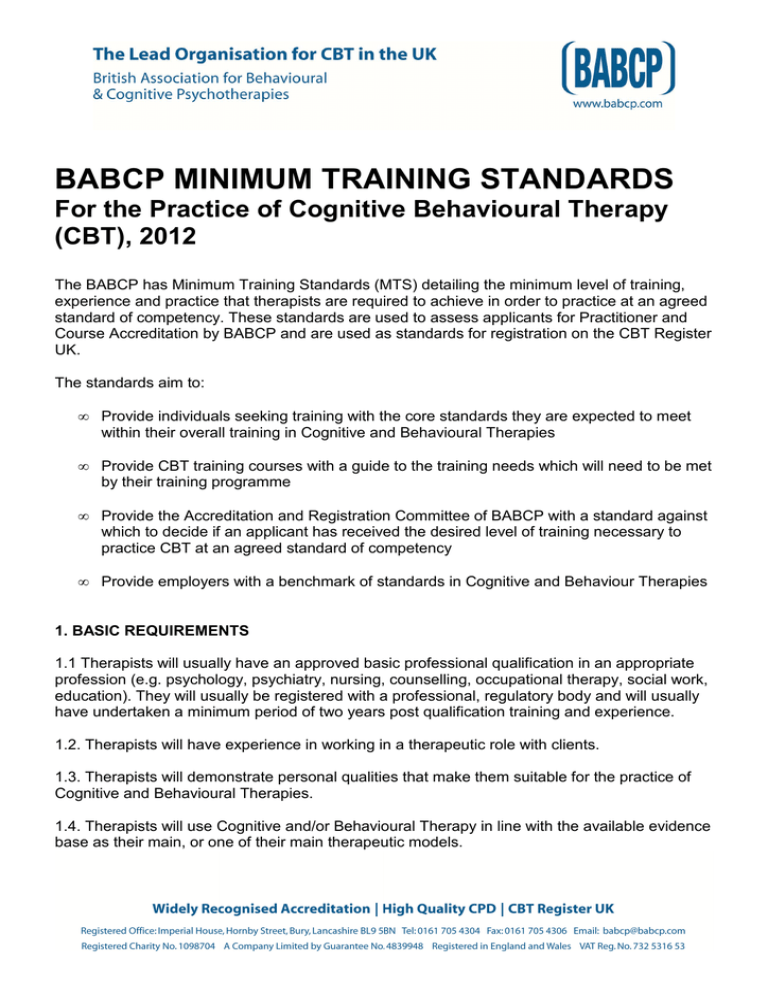
BABCP MINIMUM TRAINING STANDARDS For the Practice of Cognitive Behavioural Therapy (CBT), 2012 The BABCP has Minimum Training Standards (MTS) detailing the minimum level of training, experience and practice that therapists are required to achieve in order to practice at an agreed standard of competency. These standards are used to assess applicants for Practitioner and Course Accreditation by BABCP and are used as standards for registration on the CBT Register UK. The standards aim to: • Provide individuals seeking training with the core standards they are expected to meet within their overall training in Cognitive and Behavioural Therapies • Provide CBT training courses with a guide to the training needs which will need to be met by their training programme • Provide the Accreditation and Registration Committee of BABCP with a standard against which to decide if an applicant has received the desired level of training necessary to practice CBT at an agreed standard of competency • Provide employers with a benchmark of standards in Cognitive and Behaviour Therapies 1. BASIC REQUIREMENTS 1.1 Therapists will usually have an approved basic professional qualification in an appropriate profession (e.g. psychology, psychiatry, nursing, counselling, occupational therapy, social work, education). They will usually be registered with a professional, regulatory body and will usually have undertaken a minimum period of two years post qualification training and experience. 1.2. Therapists will have experience in working in a therapeutic role with clients. 1.3. Therapists will demonstrate personal qualities that make them suitable for the practice of Cognitive and Behavioural Therapies. 1.4. Therapists will use Cognitive and/or Behavioural Therapy in line with the available evidence base as their main, or one of their main therapeutic models. 2. LENGTH OF TRAINING 2.1 Training, including Basic Professional Training and experience and relevant Cognitive and/or Behavioural Therapy training, will usually have been over at least a four year period. 3. THEORETICAL AND SKILLS TRAINING 3.1 The period of training will include the acquisition of a critical understanding of the relevance of studies of Human Development, Psychopathology, Psychology, Social context and evidence based practice. 3.2 Therapists will have covered a minimum curriculum that has provided a broad based understanding of the theoretical basis of Cognitive and/or Behavioural Therapies and their application across a range of problem areas. Specialist courses in a particular model of Cognitive and/or Behavioural Therapies, or in a specialist area of its application, may focus on a specific area of interest. However, the basic conditions should still be met. 3.3 Skills training is an essential component of the acquisition of knowledge and experience of CBT and should not comprise less than 50% of a therapist’s total training programme. 3.4 Theoretical knowledge and skills will have been acquired through structured teaching and self-directed study. The minimum number of hours study required in the Cognitive/Behavioural elements of training is 450 hours of which 200 hours should be provided directly by recognised trainers, with documented expertise in CBT through a recognised course or other programme of study. This will usually be a Postgraduate course, delivered by a higher education institution. Demonstration of these requirements would normally be required through a mandatory, training log which specifies the length of study, content, number of taught hours and a record of the lecturers, tutors or mentors participating in a therapist’s training. 3.5 Where training is received in alternative formats from face to face teaching, the minimum amount of the 200 hours of face to face teaching required can be delivered by other media but this should total no more than 20% of the total taught content. All alternative teaching formats are required to allow either some sort of interactive teaching or opportunity for discussion/questioning/exploration and should meet all other Minimum Training Standards required (i.e. delivered by BABCP accredited practitioner or recognised equivalent). Self directed study i.e. watching a DVD, unfacilitated chat rooms or other material online is not be counted here although can be included under the 250 hours of self-directed study required. Examples of acceptable, alternative teaching formats are: a. Skype/video conference teaching b. DVD or video teaching which is facilitated by a BABCP Accredited practitioner and is accompanied by discussion etc 3.6 Therapists should achieve the skills to be able to understand and interpret research relevant to the outcome and effectiveness of Cognitive and/or Behavioural Therapy. This would usually be achieved during the formal study requirements outlined above. 2 V6-0413 4. SUPERVISED CLINICAL PRACTICE 4.1 Therapists should have conducted a minimum of 200 hours of supervised assessment and therapy during training in addition to that specified in 3.4 above. 4.2 All therapists will have received face to face individual and/or group supervision during the period of training for both assessment and therapy, carried out by a Cognitive and/or Behavioural Therapist who meets the BABCP criteria for Practitioner or Supervisor Accreditation. Where supervision was predominantly carried out in a group format, the opportunity for personal and individual supervision should have been available during training. Supervision will have consisted of regular feedback and discussion of case work on CBT. Some of this should be in the form of intensive, close supervision which will have involved the use of live, audio or video materials of the trainee conducting therapy. Supervision delivered in a non face to face medium is allowed e.g. by telephone or by video conference. For the former, telephone supervision should not have formed the majority of the supervision hours. However, this should have also met the Minimum Training Standards of being delivered by an Accredited BABCP practitioner or recognised equivalent. 4.3 A minimum of 8 clients will have been assessed and treated under supervision using CBT approaches by the trainee during the period of training before a therapist is regarded as having completed their training. These cases will cover at least 3 different types of mental health conditions (such as anxiety disorder, depression etc) or related problems and, a minimum of three cases will have been closely supervised as defined under 4.2. In order to monitor the quality and quantity of this, details of supervised clinical practice and case mix should have been recorded in a mandatory training log. 4.4 Supervised practice will have been subjected to formal assessment with four case studies written up (approximately 2000 – 4000 words), which meet the academic standards stated by BABCP Registration and Accreditation Committee; ‘Criteria for Evaluating Academic Case Studies, 2013’ (available from BABCP). It is possible for these case studies to have been presented and examined in an alternative format. For example, some CBT courses allow trainees to present a ‘live’ case report which is discussed and evaluated as part of a mandatory course assessment. If this is used, the trainee should have accompanied this by written support in order to ensure that the trainee can demonstrate that they are able to accurately reflect their case work in a written form for the purpose of report writing or case note records. This can be in the form of a short summary, detailed PowerPoint presentation etc. it is expected that only two of the case studies would be presented in this alternative format. 5. PERSONAL DEVELOPMENT 5.1 Therapists must have ensured and continue to ensure that they can identify and manage their personal involvement in the process of Cognitive and/or Behavioural Therapy appropriately. 5.2 Therapists must have developed an ability to recognise when they should seek additional professional advice and supervision. 3 V6-0413 6. ASSESSMENT OF CBT KNOWLEDGE AND COMPETENCY There is some flexibility in relation to the Minimum Training Standards in demonstrating knowledge and competency in addition to those experiences described above. These are as follows: 6.1 Therapists are expected to have demonstrated an understanding of the theoretical aspects of Cognitive and/or Behavioural Psychotherapy and its application by the production of a formal assessment essay, exam or research project. Where training has been in more than one therapeutic orientation (e.g. Doctorate in Clinical Psychology courses), these assessments should include CBT specific content which it is mandatory for trainees to complete. 6.2 An understanding of evidenced-based practice should have been evaluated using the following: a. an extended case report that critically discusses the Cognitive/Behavioural Therapy research evidence or, b. a CBT relevant research dissertation; or, c. a CBT relevant research paper to which they have contributed to, and/or published in a peer review journal. 7. ACCREDITATION OF COGNITIVE AND/OR BEHAVIOURAL PSYCHOTHERAPISTS To apply to be accredited by BABCP as Practitioner Cognitive and/or Behavioural Psychotherapist, therapists would usually have two years experience since qualification in their Core Profession, meet all the Minimum Training Standards, maintain an agreed level of continuing professional development in Cognitive and/or Behavioural Therapy, receive regular clinical supervision and adhere to the BABCP ‘Standards of Conduct, Performance and Ethics in the Practice of Behavioural and Cognitive Psychotherapies’ Published 1997, Rod Holland Revised 2012, Helen Macdonald and Gillian Haddock 4 V6-0413
